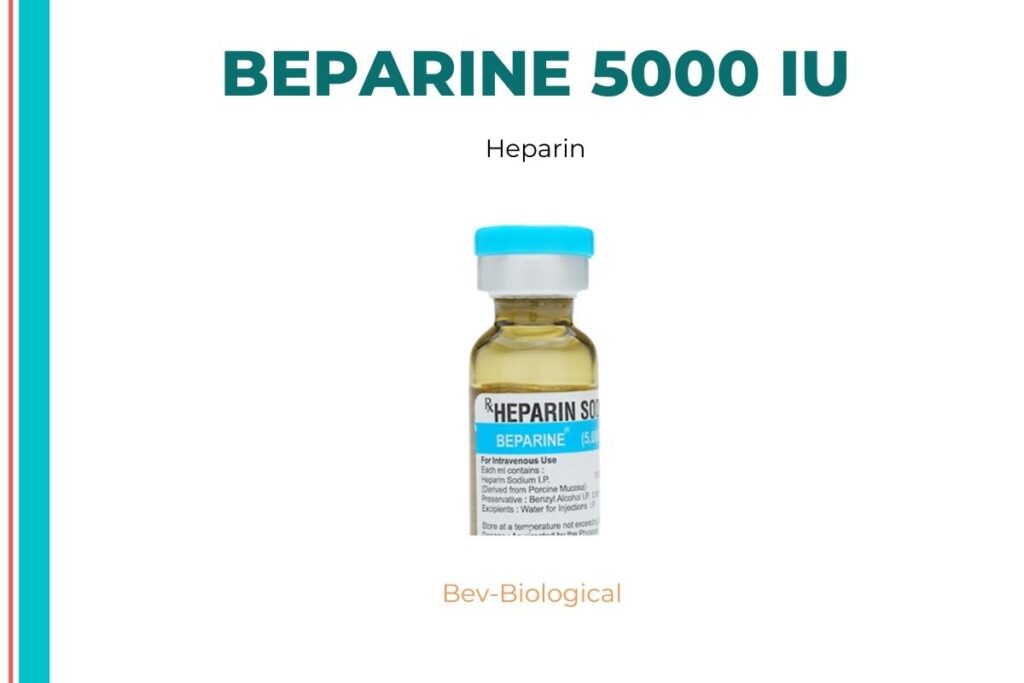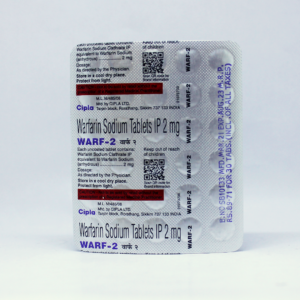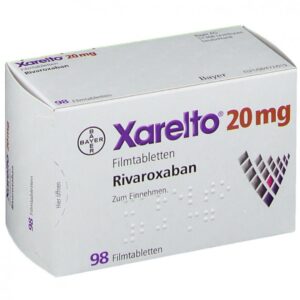Beparine 5000 IU
Anticoagulants, sometimes known as blood thinners, include Beparine 5000 IU. Beparine 5000 IU is intended to prevent and treat deep vein thrombosis (blood clots in leg veins) and pulmonary embolism (blood clots in the lungs) as well as stroke, transient ischemic attack (TIA), and heart attacks. Deep vein thrombosis is a medical disorder that causes blood clots to form in the deep veins of the legs. A pulmonary embolism occurs when a blood clot plugs one of the lungs’ arteries. A stroke occurs when a blood clot blocks blood flow to the brain, causing brain cells to die and potentially leading to permanent brain damage or death. Transient ischemic attacks (TIAs) are also known as “mini-strokes” because they exhibit comparable symptoms to a stroke but last shorter than 24 hours. A heart attack occurs when a blood clot stops a blood vessel supplying your heart, depriving it of oxygen and resulting in chest pain and, in extreme cases, death.
Blood clots form to control bleeding that happens as a result of tissue damage. Blood clots are beneficial for stopping bleeding, but when they grow inappropriately within blood arteries, they can be hazardous because they block blood vessels and prevent blood flow to vital organs including the brain, heart, and lungs. Beparine 5000 IU acts by avoiding blood clots by blocking the development of fibrin (a protein that binds platelets together and forms a clot).
A doctor or nurse will commonly administer Beparine 5000 IU. Do not self-medicate. Hemorrhage, thrombocytopenia (low platelets), hypersensitivity reactions, and elevated liver enzyme (aminotransferase) levels are all possible side effects. The majority of Beparine 5000 IU adverse effects do not require medical treatment and fade away with time. Please visit your doctor if the side effects persist or worsen.
Please inform your doctor if you are allergic to Beparine 5000 IU or any other medications. In pregnancy and breastfeeding, it is unknown whether Beparine 5000 IU causes harm to the baby or goes into breast milk. Before using Beparine 5000 IU, talk to your doctor if you’re pregnant or breastfeeding. Beparine 5000 IU is not suggested for infants under the age of two months. Before using Beparine 5000 IU, tell your doctor if you have diabetes, kidney or liver problems, blood problems, or are over 60 years old.

Beparine 5000 IU uses
Blood clot prevention is a term used to describe the process of preventing blood clots.
Medicinal Advantages
By blocking the synthesis of fibrin, Beparine 5000 IU is primarily used to prevent and cure blood clots (a protein that binds platelets together and forms a clot). Beparine 5000 IU also helps to prevent blood clots during operations (like heart surgery). Anticoagulant Beparine 5000 IU is used in blood transfusions and dialysis procedures.
Use Instructions
Beparine 5000 IU is administered by a doctor or nurse as an intravenous (into a vein) injection, infusion, or subcutaneous (under the skin) injection. Do not self-medicate. Please contact your doctor if you have any renal or liver problems before taking Beparine 5000 IU so that the dose can be adjusted appropriately. Regular blood tests are recommended for the elderly to monitor the effects of Beparine 5000 IU medication.
Store in a cool, dry location away from direct sunlight.
Beparine 5000 IU Side Effects
Beparine 5000 IU, like many drugs, can produce adverse effects like red itchy patches or lumps at the injection site, irregular bleeding, or skin redness. The majority of Beparine 5000 IU adverse effects do not require medical treatment and fade away with time. Please visit your doctor if the side effects persist or worsen.
Drug Recommendations
In situations where there is a higher danger of bleeding, use Heparin with caution. Heparin-induced thrombosis (the abnormal production of blood clots inside a blood vessel) and HITT (heparin-induced thrombocytopenia and thrombosis) are possible side effects of using the medication. All patients using Heparin should have their blood coagulation tests, such as platelet count and hematocrit, monitored. Before any operation, patients should inform their doctor that they are taking Heparin.
Interactions Between Drugs
Heparin may interact with pain relievers (salicylic acid, ibuprofen, indomethacin, phenylbutazone, and celecoxib), dextran, anti-malarials (hydroxychloroquine), blood thinners (abciximab, eptifibatide, dipyridamole), heart medications (digitalis), antibiotics (tetracycline), nicotine, antiallergics, or (nitroglycerin)
Heparin and alcohol have the potential to interact. Coriander, cabbage, spinach, broccoli, collard greens, kale (leaf cabbage), black licorice, turnip greens, avocados, and brussels sprouts are high in vitamin K and may interfere with Heparin’s effectiveness. It is best to avoid smoking, tobacco products, and nicotine because they can diminish Heparin’s effectiveness.
Drug-Disease Interaction: Use with caution in patients who have bleeding issues, thrombocytopenia (low platelet count), or thrombosis (blood clot in veins).
Safety Suggestions
ALCOHOL
It is recommended that you avoid drinking alcohol while taking Heparin because it might cause serious stomach bleeding and liver damage.
PREGNANCY
Heparin is a pregnancy medicine classified as Category C, which means it should only be given to pregnant women if it is obviously needed and has more advantages than hazards. Preservatives such as benzyl alcohol may pass the placenta, hence preservative-free variants are favored in pregnant women.
BREAST FEEDING
Heparin should only be administered to breastfeeding women if absolutely necessary and if the benefits outweigh the hazards.
DRIVING
Heparin does not normally impair your ability to drive or operate machines.
LIVER
Heparin for the liver should be used with caution, especially if you have a history of liver illness or condition. Your doctor may alter the dose if necessary.
KIDNEY
Heparin should be used with caution, particularly if you have a history of kidney illness. Your doctor may alter the dose if necessary.
No habit formation
Recommendations
While taking Heparin, regular blood tests are recommended to check prothrombin, platelets, and coagulation time.
Additional Information: This item is non-refundable.
Concerns of Patients
Deep vein thrombosis (blood clots in the legs) is a medical disorder that occurs when blood clots form in the deep veins of the legs. Leg pain or edema are common symptoms. Pulmonary embolism (blood clots in the lungs) is a disorder that develops when blood clots in the legs or other parts of the body burst and travel to the lungs. Chest pain, cough, and shortness of breath are all symptoms of pulmonary embolism. A stroke occurs when a blood clot blocks blood flow to the brain, causing brain cells to die and potentially leading to permanent brain damage or death. Transient ischemic attacks (TIAs) are also known as “mini-strokes” because they exhibit comparable symptoms to a stroke but last shorter than 24 hours. A heart attack occurs when a blood clot stops a blood vessel supplying your heart, depriving it of oxygen and resulting in chest pain and, in extreme cases, death. To lessen the danger of serious problems caused by blood clots, quick therapy is recommended.
FAQs
It is not suggested that you take ibuprofen with Heparin since the two drugs together may raise the risk of bleeding. However, before using any other medications with Heparin, talk to your doctor.
Heparin can cause hyperkaliemia (an rise in potassium levels in the blood), especially when used for a long time. As a result, if you are taking any medications that raise potassium levels in the blood, you should tell your doctor.
Heparin has the potential to cause bleeding. Please notify your doctor right away if you detect purple spots on your skin or unusual bruising, blood in your urine, black tarry stools, or unusual bleeding from your gums or nose, as these are indicators of bleeding more easily.
Allergic responses to heparin include fever, chills, trouble breathing, wheezing, blue lips, swelling of the lips, and eyes. An allergic reaction does not have to happen to everyone who takes Heparin. If you observe any of these symptoms, please contact your doctor right once.






Leave a Reply
You must be logged in to post a comment.